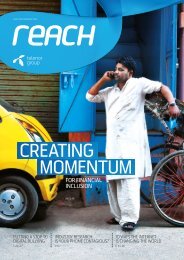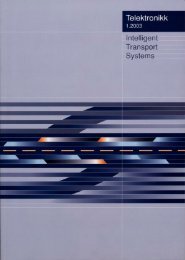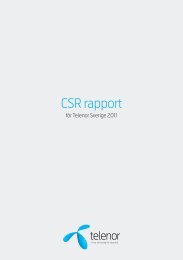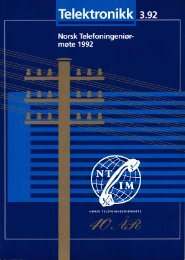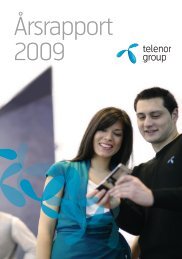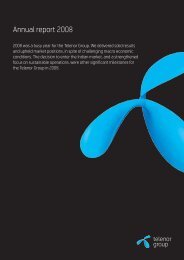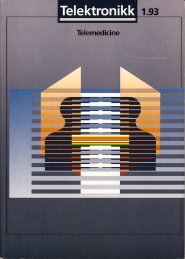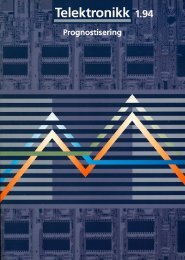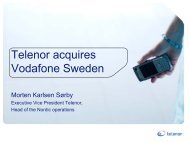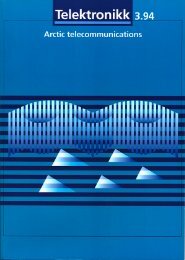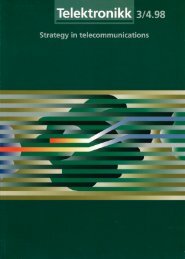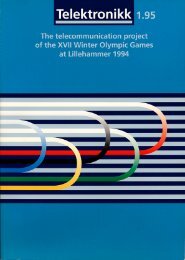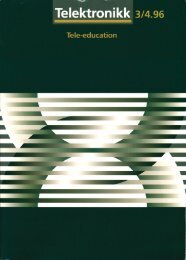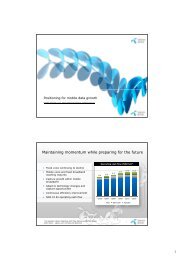You also want an ePaper? Increase the reach of your titles
YUMPU automatically turns print PDFs into web optimized ePapers that Google loves.
Per Hjalmar Lehne<br />
Telektronikk 1.2001<br />
Guest Editorial<br />
2001 is a year filled with several events for<br />
mobile communications. In September we can<br />
celebrate the 20 th Anniversary of the NMT 450<br />
system in Norway. Another event is marking<br />
how mature mobile communications has become.<br />
On March 1, <strong>Telenor</strong> shut down its NMT<br />
900 network. Later this year, UMTS will be<br />
launched.<br />
The year 2001 has long been a symbol of the<br />
future. In 1968 Stanley Kubrick directed the<br />
movie “2001 – A Space Odyssey” based on<br />
Arthur C. Clarke’s novel. It is worth noting that<br />
most of the advanced technology described in<br />
this story is still not available. However, there<br />
are ideas and concepts which many engineers<br />
and scientists are much closer to now than 33<br />
years ago. Even though we must all hope that<br />
computers will not develop the kind of behaviour<br />
of the mentally unstable “HAL 9000”,<br />
talking to computers has now become feasible.<br />
Speech based services are now being introduced<br />
in the telecom networks, with respect to recognition<br />
as well as synthesis. In his journey towards<br />
the space station “Hilton”, Dr. Heywood Floyd<br />
used an advanced video phone to wish his<br />
daughter a happy birthday. Video phones have<br />
not become widespread so far, maybe because<br />
people feel uncomfortable and unrelaxed by<br />
knowing that they can be viewed from the other<br />
end. The telephone, short message services<br />
(SMS), Internet chat, email etc. give the users<br />
some degree of “shield” against privacy intrusion.<br />
Clarke’s story gives an interesting view of<br />
what may happen when humans must relate to<br />
very advanced technology, but generally a positive<br />
attitude towards advanced computing and<br />
communications is brought forward.<br />
A more pessimistic scenario is described by the<br />
Norwegian writer Tor Åge Bringsværd in the<br />
short story entitled “Codemus” (Norwegian:<br />
Kodemus) which was published in 1970. The<br />
story was also dramatized for the TV theatre in<br />
1971 by NRK (the Norwegian Broadcasting<br />
Corporation). This story is a dystopian view of a<br />
future society where every person has his own<br />
“Little Brother” (women have “Little Sisters”).<br />
This pocket device functions as a personal terminal<br />
with telephone, diary, alarm clock and everything<br />
a person needs to function in this society.<br />
And it is completely speech controlled. It has<br />
continuous contact with a central database (“Big<br />
Brother”?) and one can not turn it off. The main<br />
character in this story, a young, single male<br />
named “Codemus”, suffers the problem that his<br />
Little Brother malfunctions. It gets disobedient<br />
to the central server (computer virus?) and<br />
directs Codemus to oversleep, not to go to work,<br />
approach a young lady (dating and marriage are<br />
strictly controlled and arranged by the central<br />
server) and even throw away his Little Brother.<br />
Little Brother insists that Codemus makes his<br />
own choices in life, however, he is not used to<br />
this and gives up and lies down crying in a park.<br />
Finally he is “saved” by automatic surveillance<br />
robots and taken care of. Codemus gets a new<br />
Little Brother and is happy again.<br />
This is a science fiction story as well as a social<br />
satire. It points out the negative consequences of<br />
advanced computer and communications technologies<br />
if used by authorities as a means of<br />
social control. It also points to the danger of<br />
being too dependent and reliant on the technology,<br />
so that if it breaks down, we do not know<br />
how to handle simple everyday situations. Just<br />
think about our own reactions if the email system<br />
or the cellular phone break down during<br />
a normal working day.<br />
This issue of Telektronikk is dedicated to what is<br />
happening at the frontier of mobile and personal<br />
communications. You will find papers from<br />
leading specialists in fields ranging from user<br />
and service aspects down to basic radio transmission<br />
problems. The content is organised in<br />
four thematic sections: Basic technology, Heterogeneous<br />
access, Network enhancements and,<br />
last, but not least, User and service aspects.<br />
Additionally, there is an introductory section<br />
giving a broader view on the visions and foreseen<br />
trends “beyond UMTS”, or towards 4 th<br />
generation mobile communications.<br />
Most of the papers are technology oriented but<br />
future mobile communications is also about providing<br />
advanced personal services on a pocket<br />
device to users, and the human and political<br />
sides are important to be aware of when developing<br />
the technology. Some of the questions are:<br />
Who is going to control the technology? Does<br />
anybody “own” the user? One of the subjects<br />
handled in this issue of Telektronikk is user-centric<br />
communications. It is time to put the user in<br />
focus, and let her/him control the situation.<br />
1



